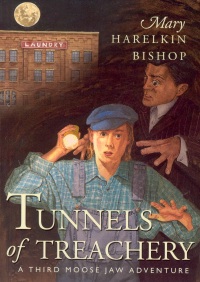| ________________
CM . . .
. Volume XI Number 5 . . . . October 29, 2004
excerpt: Staring at the part of the building that fronted onto Main Street, Andrea squinted. "That's new," she commented quietly. "I don't remember a storefront in that warehouse building. 'Moose Jaw Laundry Service,'" she read slowly. "That's where we lost Kami, right?" Tony asked. "Yes," Andrea replied." That underground storage area leads into the basement of the warehouse building. Rosie's house is just up the block from there. They must have taken us out another secret passage that leads directly up to the street. I didn't recognize it, though," she muttered, staring at the small wooden door set back from the street. It was almost lost in the dark shadows. "I guess there are more tunnels around here than I realized. I especially don't remember using that creepy spiral stairway," she said, shuddering, "The steps were so worn, I thought I'd fall through!" "We're in big trouble, Andrea," Tony whispered, tears beginning to well up in his eyes again. "What are we going to do? We lost both Kami and Eddie!" This is Andrea's third and Tony's second trip back to the 1920s in the famous tunnels under the city of Moose Jaw, but this time they are accompanied by their friends Kami and Eddie, Chinese-Canadian twins. The twins' grandparents had been indentured servants---slaves really---working to save enough money to pay the government's Head Tax and become legal immigrants. Eddie and his sister had not been interested in their grandparents' stories, but they learn firsthand what their grandparents went through as they are impressed into work gangs at laundry and grocery store/opium smuggling operations, respectively. Andrea and Tony need all their ingenuity---and the help of their grandparents who, at this stage, are only a few years older than they!---to rescue the twins and get all of them back to their own time. Not all phases of any country's history are noble and uplifting, and certainly the Canadian government's treatment of Chinese immigrants, imported originally to be cheap and expendable labour for the building of the railway and later to be merely cheap and expendable labour, is one of its darker moments. At least Eddie was able to reassure Mr. Wong, one of the leaders in the struggle to improve the lot of the Chinese workers, that things would improve. "Canada doesn't charge a Head Tax any more. Chinese people can work in any job they like. We have Chinese doctors, lawyers, teachers, musicians..." (p. 281). To someone who had risen as far as he possibly could in Canadian society---and was still only the owner of a very small and insignificant restaurant---this must have seemed wonderful indeed. It puts the achievements of those modern doctors, lawyers, etc. into a clearer perspective for all of us, as it did for Kami and Eddie. The Moose Jaw tunnels are for real, too. They were in the news recently when they were damaged by fire, but they are important pieces of that city's history as well as of its present-day tourist industry. Whether the tunnels were actually used for rum running and other illegal operations is not known for certain, but it seems likely that they would have been for "underground activities"! Writers of historical fiction, especially those writing for young people, have to be careful not to let their natural desire to instruct and inform take precedence over the telling of a good story. The facts should be right---and I have no reason to doubt Bishop's research---but they shouldn't hit you over the head. When Tony is in the process of being hired as a go-fer by one of the tunnel operations, readers get a couple of long paragraphs of description of what the workers are being fed and Tony's reflections on how unfairly they are being treated. This is overkill. On occasion, I found the language a bit awkward as well. Do the men in the tunnels always have to be referred to as "bad guys," both by the children and in the general text? These are small points, however, in a story that is gripping and full of much that is of great interest to readers of any age. Recommended. Mary Thomas works in the library of an elementary school in Winnipeg, MB.
To comment
on this title or this review, send mail to cm@umanitoba.ca.
Copyright © the Manitoba Library Association. Reproduction for personal
use is permitted only if this copyright notice is maintained. Any
other reproduction is prohibited without permission.
NEXT REVIEW |TABLE OF CONTENTS FOR THIS ISSUE - October 29, 2004. AUTHORS | TITLES | MEDIA REVIEWS | PROFILES | BACK ISSUES | SEARCH | CMARCHIVE | HOME |
